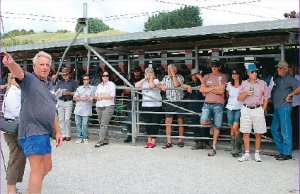Chris and his wife Wendy milk 360 cows on their 120ha farm just north of Whangarei and have milked OAD since they bought the farm in 2007, except for twice a day milking for just one year in the 2010-11 season.
The couple have been mainly running a once a day operation ever since they were lower order sharemilkers after seeing some severe empty rates in the herd they were managing.
Lethbridge says a Northern Wairoa farm he was on was getting production figures of 360kgMS per cow, but the animal's health was suffering.
"The end result was that we had 30% empties in the autumn and 20% empties in the spring," Lethbridge told a Smaller Milk and Supply Herds (SMASH) field day on his farm recently. "That was probably a reasonably good driver (to start once a day milking) through the wastage of all of those animals."
Lethbridge now gets an average of 100 heifers out of a regime of six weeks AB (artificial breeding) and six weeks natural breeding from his 360 cows. An average of 75% of his herd get in calf in the first three weeks.
This is even though he doesn't use CIDRS or induction of any kind.
"My idea of once a day is that if the cows are going to have it easy, they are going to need to prove that they can do it easy," says Lethbridge. "They have to do the work not me."
Farm working expenses are also incredibly low, with the four year average for each kgMS costing $3.31 compared to the district benchmark cost of
$4.12 and the MAF
benchmark of $3.68.
Lethbridge says reduced costs haven't resulted in a drop in production with the farm producing more than when they took it over in 2007.
In fact when the Lethbridges went back to twice a day for a season in 2012 to handle a feed management problem they saw their production fall while farm working expenses climbed steeply.
It cost $3.74/kgMS from 2010-12 with the farm producing 91,486 kgMS, less than their first year on the farm.
The current season is heading towards 93,000 kgMS with production figures already running at 1% higher than where they were at last year.
Lethbridge says it will also be a more enjoyable year.
"Last year was probably the hardest year ever on my marriage," says Lethbridge.
Milking OAD has allowed the Lethbridges to use their replacement policy as another form of income.
The couple buy in 120 in-milk empties every year, milk them for a year, get them in calf and then sell them on as in-calf empties.
Lethbridge says the only downside is a slightly higher somatic cell count from the imported cows.
However, this hasn't been a huge issue with the average SCC count falling from 310 in 2007 to
233 this season.
Lethbridge says he wonders if people don't go once a day because they think they can't afford it or be because of cell count.
"You've probably already got a SCC problem, milking once a day is not going to make it worse," he says.
















